About us
The EC-UNDP
Partnership on electoral assistance
The European Union (EU) and the United Nations Development Programme (UNDP) are two global institutions which share a common vision towards the virtues of democratic governance.
Moreover, both institutions recognize the value of electoral assistance in supporting the long-term, sustainable establishment and development of democratic institutions world-wide.
For its part, the EU is one of the main donors in the field of electoral support. The European Union’s support to elections takes the form of electoral assistance projects, implemented by the European Commission and EU election observation missions carried out by the European External Action Service (EEAS).
These are independent but complementary activities, implemented through different financial instruments.
EU support for human rights, democracy and the rule of law is established in the Treaties. Article 6 of the Treaty on European Union (TEU) clearly states that the principles of liberty, democracy, respect for human rights, and the rule of law are fundamental European values.
The “Communication from the Commission on EU Election Assistance and Observation” (2000) defines the importance of EU electoral support and the complementarity of electoral assistance and electoral observation.
Since 2007 the European Commission has funded electoral assistance programs of more than 500 million euros in some 70 countries. EU support to democracy and electoral support has evolved in the past few years, encompassing new instruments, a more nuanced approach to the complexities of democratic systems, and a greater emphasis on country specific approaches.
Election observation is a crucial EU activity aiming to strengthen democratic institutions, build public confidence in electoral processes, help to deter fraud, intimidation and violence.
The EU promotes a strong link between election observation and electoral assistance, through follow-up on EOM recommendations, aiming to improve future elections, strengthen democratic institutions and enhance the wider process of democratization.
The implementation of EOM recommendations has both a technical and political dimension, addressing the electoral process and its wider framework. EU actions between elections are carried out in a coherent and coordinated manner on a long-term basis.
As one of the world’s largest multilateral development agencies, present in over 170 countries and territories, UNDP strives toward democratic governance and peacebuilding by helping governance institutions in countries bring constitutional reforms and organize credible elections through reconciliation, empowerment and inclusion.
Under the auspices of the Global Project for Electoral Cycle Support (GPECS), UNDP has distinguished itself by its ability to be “first on the ground” by using a rapid response and a fast-track mechanism to request and provide technical assistance to member states.
One of the most successful feature of UNDP lies in that its electoral assistance experts are able to provide in-depth expertise to governments and Electoral Management Bodies (EMBs) in view to design of appropriate electoral policy, legal and regulatory frameworks and organize free, fair and transparent elections.
As such, the European Commission (EC) and UNDP are natural partners in the field of electoral assistance. Electoral assistance projects constitute one of the largest area of EC-UNDP programmatic cooperation on the ground, with partnership on over 100 electoral assistance projects since 2006.
The framework - The Guidelines, FAFA and beyond
In 2006, the EC and UNDP strengthened and formalized their de facto partnership in the field of international electoral assistance with the signature of the Electoral Assistance Guidelines.
The Guidelines were renewed in 2008 and most recently in April 2016, when they were officially endorsed and signed by the UNDP Administrator Helen Clark and the Commissioner Neven Mimica (see video of the event).
The Guidelines establish the Joint Task Force on Electoral Assistance (see below for details) and set parameters for cooperation between the two organizations on issues such as project formulation, recruitment, visibility and operational support to the ongoing projects and troubleshooting.
The programmatic cooperation between the EC and the UN is also facilitated by the Financial and Administrative Framework Agreement that was agreed in 2003 and updated most recently in 2014.
Through a single shared legal, financial and administrative framework, the FAFA has made programmatic cooperation more efficient, ensuring faster start-up of activities and ensuring administrative consistency across operations.
In 2004, the UNDP and the EC entered into a Strategic Partnership Agreement through the signature of a Memorandum of Understanding to set out and better define the relational focus between the two institutions.
The objective of the SPA is to facilitate policy dialogue and specific collaboration at global, regional and country levels and is expected to bring harmonization and complementarity as well as financial cooperation between the two entities.
The Joint Action Plan on Visibility between the EU and the UN was signed in 2006, and builds on the FAFA.
The action plan emphasizes the shared commitment to communicate the results of the UN-EU partnership to beneficiaries and external stakeholders, both in the interest of transparency in the use of public funds – and as a means to foster global solidarity.
An important communication tool, the Joint Visibility Guidelines for EC-UN actions in the field was adopted in April 2008 and provides practical advice to staff from both organizations who work in the field.
The instrument - Joint Task Force strengthening the Partnership
The Guidelines established the EC-UNDP Joint Task Force on Electoral Assistance (JTF), a Brussels-based coordination mechanism that “has the aim of increasing the overall efficiency and adherence of the projects to the common EC-UNDP strategic approach”.
The Joint Task Force, composed of the EU and UNDP experts, has been expanded in 2016 to include representatives from the European External Action Service (EEAS) and UN’s Department of Political Affairs/Electoral Assistance Division (DPA/EAD), as well as relevant geographical desk representatives from both organizations.
What we do
The JTF provides in-depth technical and advisory support to all EC-UNDP joint electoral assistance projects world-wide, through the conduct of in-country missions as well as remote support from Brussels.
JTF assists UNDP Country Offices and EU Delegations in formulation, implementation, monitoring and evaluation, as well as in drafting of the narrative and financial reporting.
In line with the Guidelines and to further promote the partnership in the field, JTF establishes and maintains dedicated websites for all EC-UNDP joint electoral assistance projects, and organizes kick-off trainings for both UNDP CO and EUD staff in country at the inception of each project.
In 2004, the UNDP and the EC entered into a Strategic Partnership Agreement through the signature of a Memorandum of Understanding to set out and better define the relational focus between the two institutions.
The objective of the SPA is to facilitate policy dialogue and specific collaboration at global, regional and country levels and is expected to bring harmonization and complementarity as well as financial cooperation between the two entities.
The Joint Action Plan on Visibility between the EU and the UN was signed in 2006, and builds on the FAFA.
The action plan emphasizes the shared commitment to communicate the results of the UN-EU partnership to beneficiaries and external stakeholders, both in the interest of transparency in the use of public funds – and as a means to foster global solidarity.
An important communication tool, the Joint Visibility Guidelines for EC-UN actions in the field was adopted in April 2008 and provides practical advice to staff from both organizations who work in the field.
The JTF team
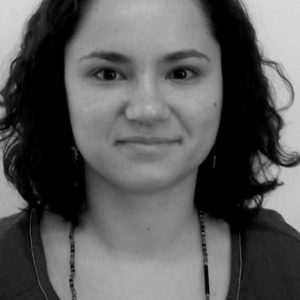
Laura Bretea
Policy officer, DEVCO B1, European commission
Laura Bretea is a Policy Officer within DEVCO at the European Commission.
Prior to joining the European Commission, Laura has worked on electoral assistance and electoral observation in numerous countries, most recently Egypt, Afghanistan and Nigeria.
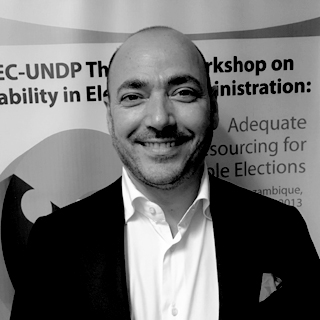
Gianpiero Catozzi
Senior electoral advisor, UNDP
Gianpiero Catozzi is part of UNDP Bureau for Policy and Programme Support (BPPS) serving since 2013 as UNDP senior electoral advisor and coordinator of the Joint EC-UNDP Task Force on Electoral Assistance (JTF) based in UNDP Brussels liaison office.
In this capacity, Gianpiero participates to needs assessment missions and advises UNDP country offices on electoral affairs.
He is in charge of electoral project formulation, the coordination and development of knowledge products, such as electoral publications, E-Learnings, global conferences and seminars.
He has visited over 25 countries in this capacity.
Previously Gianpiero was posted as UNDP Regional Electoral Advisor for West Africa based in UNDP regional centre in Dakar, Senegal, where he covered 23 countries of the region.
In that capacity Gianpiero participated to numerous DPA-lead needs assessment missions as UNDP representative and lead numerous project formulation missions, advisory missions, follow up missions and troubleshooting missions in the entire region.
He has also worked as senior electoral advisor for several international organisations such as the European Commission, the OSCE, UN mission settings (DPKO) and non-mission settings in numerous countries around the globe including as UNDP Chief Electoral Advisor (CTA) in Rwanda, Ivory Coast, Haiti and within expert missions around the globe.
He has contributed to several UN publications including on the introduction of ICT in electoral processes, on participation of youth in electoral processes, on the sustainability of electoral processes and on electoral violence.
Gianpiero holds a Bachelor degree in political science from the University of Sussex in the UK, a Master’s Degree in International Relations from the European Institute of the University of Sussex, UK and a post-graduate in Economics from the Solvay business school of the Université Libre de Bruxelles (ULB).
He speaks fluently French, English and Italian and has an advanced working level in Spanish. Gianpiero has two children.
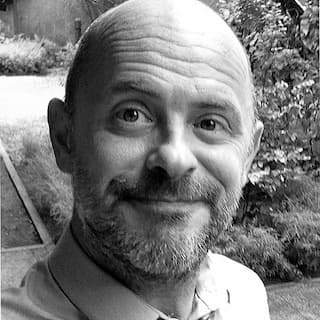
Riccardo Chelleri
Policy officer, EEAS
Riccardo Chelleri is a policy officer at the Democracy and Electoral Observation division of the EEAS.
He has about 15 years of professional experience in the electoral field, covering observation, supervision and technical assistance to electoral processes.
He is currently focal point for elections in Africa at the EEAS and also working on observation methodology development and the use of electoral ICT.

Saré Knoope
Programme Analyst - Elections, UNDP
Saré graduated with distinction from King’s College London with a Master in Conflict Resolution in Divided Societies from the Department of Middle Eastern Studies.
For her Master’s thesis, she researched the relationship between the Syrian State and the Syrian Kurdish minority since 2011.
Her Bachelor thesis looked at the impact of the Arab Spring in Egypt and Syria on the Palestinian Resistance Strategy.
She has internship experience in conflict prevention and resolution in various contexts, including at the Institute for Justice and Reconciliation in South Africa, the Counter-Terrorism Executive Directorate of the UN in New York and the European External Action Service in Brussels.
Before joining UNDP Brussels, at the Clingendael Institute in The Hague, she was involved in a project on Human Security and CVE, working on Iraq, Egypt and the Palestinian Territories.
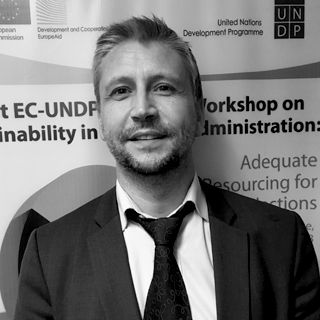
Thomas Millar
Team leader for democracy, EUROPEAN COMMISSION
Tom Millar is Team Leader for Democracy with unit DEVCO B1 – Human Rights, Gender, Democratic Governance.
Before joining the unit he has worked on governance and democracy issues in EU Delegations in Nigeria, Jamaica and Uganda.
As head of both political and operational sections, he has wide experience of the multi-dimensional aspects of democracy, and its criticality to wider issues of governance and development.
He is British and a strong supporter of the European Union and its values.
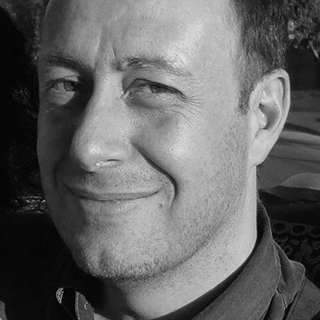
Gianmarco Scuppa
Head of sector, EEAS
Head of sector “policies and thematic support”, Directorate for an Integrated Approach for Security and Peace, European External Action Service (EEAS)
In this function he provides methodological and operational support to EU services in the field and at HQ on issues related to conflict prevention and peacebuilding, in particular on rule of law, governance, and electoral conflict prevention.
He was previously in the EEAS Africa Department in charge of the political relations with West Africa. In 2006-2010 he was Head of the Political Section in the EU delegation to Côte d’Ivoire, where he was involved in peace negotiations and electoral assistance.
His previous professional experience includes the United Nations, the World Bank and several NGO’s and consulting companies.

Mathilde Vougny
Programme Analyst - Elections,
UNDP
Before joining the EC-UNDP Joint Task Force on Electoral Assistance, Mathilde worked as a policy/program intern for the UNDP Regional Bureau of Africa and Regional Bureau of Arab States in Brussels. She focused on EU policy and programmatic initiatives related to development and cooperation in those regions.
Prior to joining UNDP, Mathilde worked for Human Rights Watch in Geneva and Brussels on resource mobilization and research on monitoring policy-making with impact on human rights in the Middle-East.
Mathilde holds a Bachelor in political science from the University of Lausanne (Switzerland), a Master’s Degree of International Relations and Security from the Université Libre de Bruxelles (Belgium) and a Master’s Degree of International Affairs with a focus on Cyber-governance from the American University in Washington D.C. (USA). For her research in this field she received the faculty’s Notable Professional, policy and practical contribution Award.
Her Master thesis looked at the use of commercial satellite imagery by non-governmental organizations and its impact on human rights international advocacy.
Mathilde speaks French, English and Spanish.
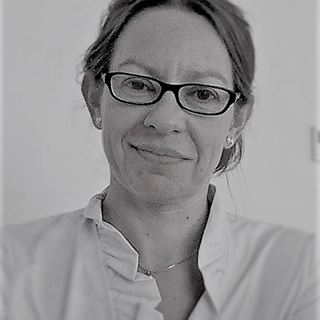
Malgorzata Wisniewska
Programme Specialist - Elections, UNDP
Malgorzata Wisniewska works as a Programme Specialist in Electoral Assistance with the UNDP Bureau for Policy and Programme Support (BPPS). She has over 15 years of experience in electoral assistance, mostly with the United Nations, combining experience in direct technical electoral assistance in numerous post-conflict settings with overall advisory and programmatic support carried out from headquarters in NY and Brussels through multiple assessment and advisory missions in Africa, Latin America and Caribbean, Asia and Pacific.
Malgorzata holds a PhD in international public law from the University of Vigo, Spain. She speaks Polish, Spanish, English and French, as well basic Russian and Portuguese.

Thomas Millar
Team leader for democracy, EUROPEAN COMMISSION






